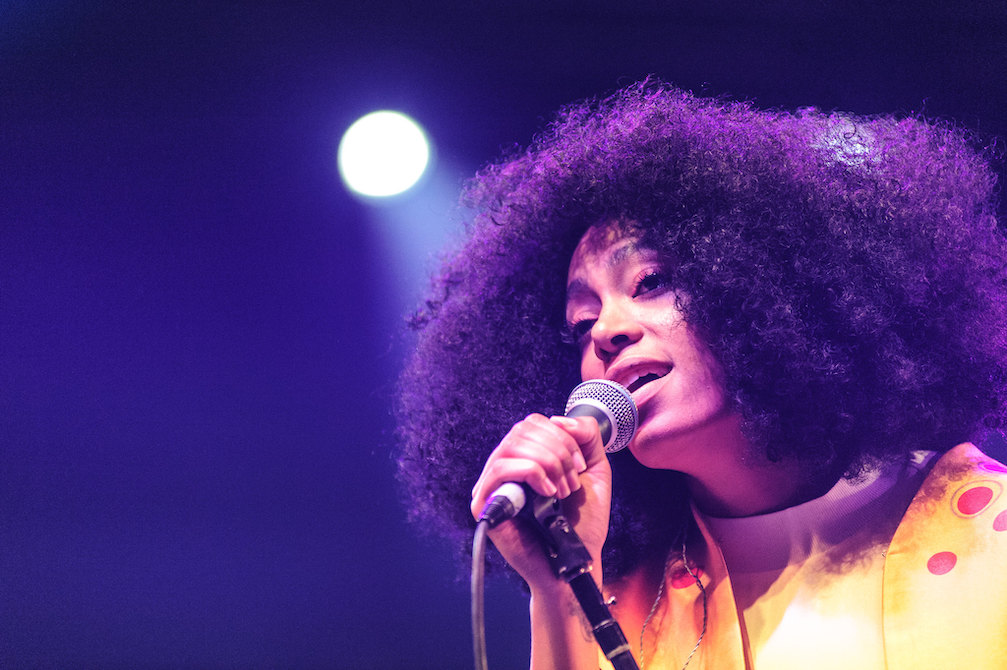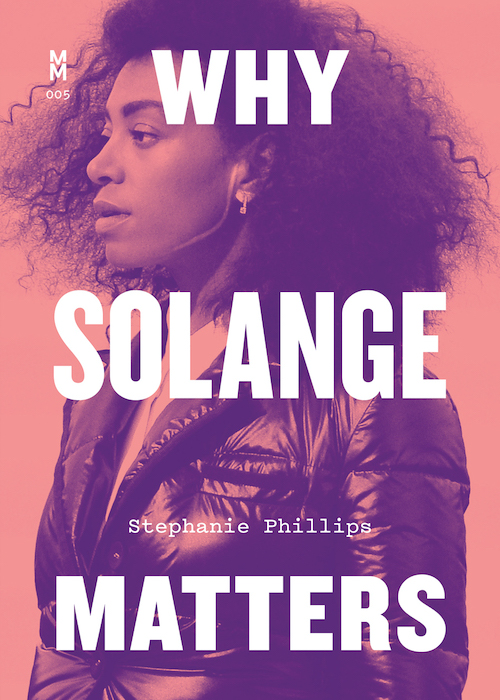
Solange performing at the Coachella Valley Music and Arts Festival in 2014 (Flickr/Neon Tommy)
The first time Stephanie Phillips, a London-based music journalist and the frontwoman of the punk trio Big Joanie, saw music polyhistor Solange Knowles, it was nearly baptismal.
It was July 2017, and Phillips and her friends were at the Lovebox Festival in London.
"Up there in the air, looking down from above on the sea of festival-goers, I could suddenly see my place in this fandom," Phillips writes in Why Solange Matters. "Throughout the crowd, there were replicas of my own friendship group. Pockets of Black girls grouped together screaming and living in the moment."

Solange was hospitalized three days before her performance for dysautonomia, an incurable autonomic nerve disorder. The singer later revealed that she broke out of the hospital to perform at Lovebox. "I knew this place was going to be filled with so much love," Phillips recalls the singer saying to the crowd of passionate, adoring fans.
The appearance was a year after her groundbreaking third studio album, "A Seat At the Table," which helped Solange redefine her multitudinous vision of Blackness and explore what it means to grapple with intergenerational, Black trauma.
Why Solange Matters, released on April 6, is part of the University of Texas Press' Music Matters series. In eight chapters, Phillips analyzes Solange's musical evolution and connects the dots between the music and her experiences as a Black British woman.
Solange was born in Houston in 1986 to Tina and Mathew Knowles and is the younger sister of music icon Beyoncé. In 2002, she released her first album, "Solo Star," at 15. At the time, she was a backup dancer in her older sister's group, Destiny's Child, and initially, she wanted to make a lovers rock album. Still, the label executives at Columbia Records eschewed her vision.
While Solange co-wrote and co-produced nearly all of "Solo Star," the album fell into obscurity as her older sister prepped her breakout solo album "Dangerously in Love," which debuted the following year at #1 on the Billboard 200 chart.
For years, many would accuse Solange of simply capitalizing on her sister's fame.
Phillips likens Solange's musical trajectory to the ascension of teen pop darling Billie Eilish, who's nabbed seven Grammy Awards since her 2019 debut album, "When We All Fall Asleep, Where Do We Go?" Eilish, alongside her older brother, co-songwriter and producer, Finneas O'Connell, is often glorified as the sole creator of an avant-garde sound that has received worldwide critical acclaim and numerous awards. As Phillips sees it, perhaps 15-year-old Solange would have received more visibility during the social media and "e-girl" era, even more so if she were white.
Advertisement
Throughout Why Solange Matters, Phillips also tackles institutional racism. She focuses on the 1993 racially motivated murder of southeast London teenager Stephen Lawrence and numerous Black British victims who have died in police custody, including Sheku Bayoh, Sarah Reed and Sean Rigg. To those living in the United States, before Prince Harry, Duke of Sussex and Meghan, Duchess of Sussex, leaving the British monarchy in 2020, England may have falsely appeared to be a glowing example of a burgeoning multicultural society. However, reality set in during 2016, when the United Kingdom voted to leave the European Union in a deliberate move coined as "Brexit" following years of heightened xenophobia, Islamophobia, and blatant racism.
A native of Wolverhampton, Phillips relocated to South London in 2006, where the milieu of Blackness thrived. She created the Decolonise Festival for people of color in the punk scene and as a rebellion against the powers that be. Although punk music is historically associated with white audiences and bands like the Sex Pistols and The Clash, Phillips was determined for Decolonise Festival to become a safe space for Black punks, greatly inspired by "proto-riot grrrl" British punk icon, Poly Styrene.
Just two years after Phillips created Decolonise Fest, Solange made a triumphant return to music, paying homage to the doo-wop, soul and psychedelic music of the 1960s on her 2008 sophomore album, "Sol-Angel and the Hadley St. Dreams."
A newly divorced, single mother, Solange nodded to the charm of '60s soul influences, using heartbreak as a springboard for her beatnik sound. The album received critical acclaim, yet it was also rashly compared to U.K. retro-soul artists, including Amy Winehouse and Duffy. Although Solange tapped frequent Winehouse producer Mark Ronson for "Sol-Angel," she looked to early Motown sound and vintage girl groups, including The Supremes, The Marvelettes and The Veltones, a harmony group that her mother was a part of in high school.
With a boost in momentum and a fresh cult-following, Solange joined Terrible Records, a Brooklyn-based boutique label co-founded by Grizzly Bear bassist Chris Taylor. Solange found a kindred spirit in multi-hyphenate British artist Dev Hynes (who commonly performs under the moniker Blood Orange). The two collaborated on Solange's 2012 new wave EP "True," which, like "Sol-Angel," was lauded for its throwback experimental resonance.
Solange became the face of the viral campaign, "Black Girl Magic," for cutting off her locks in transition to growing a natural afro. Still, many described her, quite condescendingly, as a vagabond "blipster" (or "Black hipster") for being radically different from common racial archetypes of Black women artists. She wasn't a video vixen, nor was she trying to be her sister.
Yet when Solange questioned the indie music scene for critiquing her, Jon Caramanica of The New York Times criticized her. To Caramanica, Solange owed an outstanding debt to Grizzly Bear for revamping her style, sound and introducing her to a white audience, adding that she should stop "biting the hand that feeds you."
The remark tore into Solange, who decided to create a new platform for herself and other Black artists who didn't need acceptance by white listeners and critics. In 2013, she started her record label, Saint Heron Records.
Although the book focuses on Solange's creation of her own artistic space, Why Solange Matters glosses over the artists that Solange launched into Tumblr-centric notoriety on the label's 2013 compilation album "Saint Heron." Phillips discusses progressive R&B and electronic singer-songwriter Kelela and English soul musician Sampha but makes no mention of former Bad Boy Records singer Cassie, cloud R&B duo BC Kingdom and longtime Solange background vocalist and guitarist Starchild.
Much of Why Solange Matters focuses on "A Seat At The Table" and its resonance with Black listeners. The midsection of the book is a rundown of virtually every track from the album. Phillips critiques Solange's choice of rapper and entrepreneur Master P as the album's narrator. While Solange was well-intentioned, Phillips writes, Master P represents Black capitalism, which evades the message of oppression and mental warfare throughout "A Seat At the Table."
During the latter portion of Why Solange Matters, Phillips highlights the jam session creation of Solange's 2019 album "When I Get Home." The album, her fourth, is a celestial homage to Houston, featuring songs like "Almeda," "Binz," "My Skin My Logo." The album is a beautiful, organic evolution from the sound and themes heard on "A Seat At the Table." A more granular analysis, like Phillips applied to Solange's third album, could have also been applied to the shorter section on "When I Get Home."
Still, it's fun to discover what Solange's music — already cherished by American fans — means for Black women in the United Kingdom. Phillips studied Solange's life closely and gave voice to listeners, journalists and fellow creatives whose art was morphed by "A Seat At the Table."
In less than 250 pages, Phillips celebrates and humanizes a woman whose artistic and personal milestones allowed the author's "Black girl weirdo self a space to exhale."








